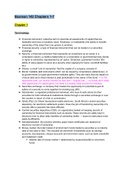Resume
Summary comprehensive summaries of business management of 142
- Cours
- Établissement
- Book
comprehensive and detailed summary of chapters 1-7 of the business management 142 textbook (introduction to investment management) and all lecture material. chapters 2 and 3 are far less comprehensive (chapter 3 was not really summarised because it is more about application). These notes are perfec...
[Montrer plus]





